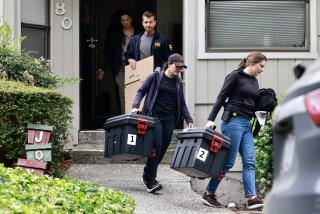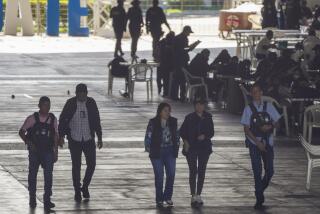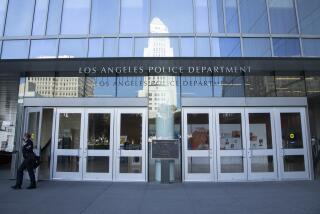Bell Gardens, Cudahy Raided in Sweep by D.A.
Large teams of district attorney’s investigators raided city halls of two southeast Los Angeles County cities Tuesday, searching offices for documents and records as part of a wide-ranging public corruption investigation.
Sweeping into Cudahy City Hall shortly after it opened, investigators ordered employees out of their offices and sealed off the building from the public for much of the day. At nearby Bell Gardens City Hall, investigators executed search warrants.
In all, 46 investigators fanned out across the two cities and searched at least seven residences or businesses, a law enforcement source said. Among the homes they went to were those of the city managers of both cities, and at least one of those was searched.
Investigators also searched the business and City Hall offices of Bell Gardens City Atty. Arnoldo Beltran. “It is our understanding that he is not a target or subject of any criminal investigation,” said Beltran’s attorney, Mark Geragos, noting that investigators did not search his client’s home.
The raids were part of an ongoing probe of the blue-collar cities, which have histories of scandal-plagued politics and struggling casinos.
“When I left Friday, everything was business as usual, [but] this morning, it was just, ‘Sorry, we’re closed,’ ” said Mitchell Dick, who works for the Cudahy public library.
An official with the district attorney’s office said the investigation is being conducted by the public integrity division, which investigates allegations of public corruption.
District attorney’s spokeswoman Sandi Gibbons said items had been seized during the raid, but would not provide details. No one was arrested, she said.
Cudahy and Bell Gardens are small, densely populated cities separated by the Los Angeles River a few miles southeast of downtown Los Angeles. Both are poor, overwhelmingly Latino cities still struggling to remake themselves decades after major industries left the area.
Cudahy, a one-square-mile city of about 24,000 people, is home to one of the first casinos catering to a largely Latino clientele. Bell Gardens, with a population of 45,000, has long relied on tax revenues from the Bicycle Club casino, which has been the focus of money laundering and election fraud probes.
It is not clear what investigators were searching for. Some former Bell Gardens council members believe they were seeking records substantiating complaints of electoral fraud in the recent Bell Gardens election.
In Cudahy, City Clerk Larry Galvan said investigators presented a search warrant authorizing them to inspect numerous documents, including city contracts, payroll records, e-mail, business ledgers and canceled checks.
He said all employees were ordered out of the building. Later, the code enforcement and parks and recreation departments were allowed to reopen.
Both cities are known for their raucous political scenes; recall campaigns and allegations of election fraud are common.
In Bell Gardens, the most recent controversy erupted when the City Council appointed one of its members, Maria S. Chacon, to be city manager, despite concerns by some City Hall critics that Chacon, who does not have a college degree, is not qualified for the $80,000-a-year post.
In this year’s election, two council members who opposed a proposed contract extension for Chacon were ousted by a Chacon-backed slate. Rogelio Rodriguez, one of the replaced council members, said he filed a complaint with federal authorities alleging electoral fraud and said he had recently been interviewed by investigators. It is not clear, however, if Rodriguez’s complaint is related to Tuesday’s raid.
Cudahy too is managed by a former council member, George Perez, who was appointed to his post by fellow members. Perez said investigators spent two hours at his house and seized a few files.
A former Cudahy council member said news of the investigation did not surprise her. Araceli Gonzalez, who resigned from her seat this year, said she had noticed many suspicious things during council meetings, with officials often refusing to answer her questions about the city’s business. She could not provide specifics, however.
“It gives me great peace of mind to know that the [district attorney’s] office is doing its job,” she said. “People can’t run around and think they can do whatever they want at the expense of the public.”
*
Times staff writers Scott Glover and Greg Krikorian contributed to this story.
More to Read
Sign up for Essential California
The most important California stories and recommendations in your inbox every morning.
You may occasionally receive promotional content from the Los Angeles Times.











